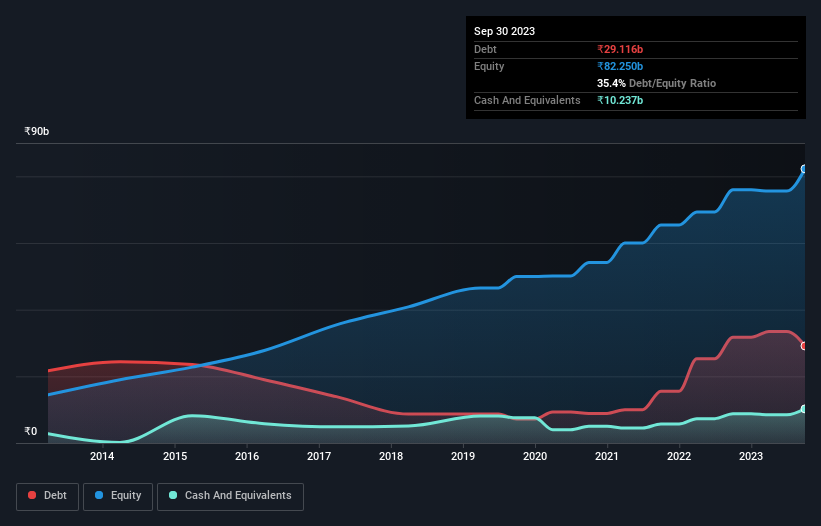- India
- /
- Auto Components
- /
- NSEI:BALKRISIND
We Think Balkrishna Industries (NSE:BALKRISIND) Can Stay On Top Of Its Debt

The external fund manager backed by Berkshire Hathaway's Charlie Munger, Li Lu, makes no bones about it when he says 'The biggest investment risk is not the volatility of prices, but whether you will suffer a permanent loss of capital.' So it might be obvious that you need to consider debt, when you think about how risky any given stock is, because too much debt can sink a company. As with many other companies Balkrishna Industries Limited (NSE:BALKRISIND) makes use of debt. But the more important question is: how much risk is that debt creating?
What Risk Does Debt Bring?
Debt is a tool to help businesses grow, but if a business is incapable of paying off its lenders, then it exists at their mercy. Ultimately, if the company can't fulfill its legal obligations to repay debt, shareholders could walk away with nothing. However, a more frequent (but still costly) occurrence is where a company must issue shares at bargain-basement prices, permanently diluting shareholders, just to shore up its balance sheet. Of course, the upside of debt is that it often represents cheap capital, especially when it replaces dilution in a company with the ability to reinvest at high rates of return. When we think about a company's use of debt, we first look at cash and debt together.
Check out our latest analysis for Balkrishna Industries
What Is Balkrishna Industries's Debt?
You can click the graphic below for the historical numbers, but it shows that Balkrishna Industries had ₹29.1b of debt in September 2023, down from ₹31.7b, one year before. On the flip side, it has ₹10.2b in cash leading to net debt of about ₹18.9b.

How Strong Is Balkrishna Industries' Balance Sheet?
According to the last reported balance sheet, Balkrishna Industries had liabilities of ₹30.6b due within 12 months, and liabilities of ₹12.9b due beyond 12 months. Offsetting these obligations, it had cash of ₹10.2b as well as receivables valued at ₹9.82b due within 12 months. So its liabilities outweigh the sum of its cash and (near-term) receivables by ₹23.4b.
Given Balkrishna Industries has a market capitalization of ₹483.2b, it's hard to believe these liabilities pose much threat. But there are sufficient liabilities that we would certainly recommend shareholders continue to monitor the balance sheet, going forward.
We measure a company's debt load relative to its earnings power by looking at its net debt divided by its earnings before interest, tax, depreciation, and amortization (EBITDA) and by calculating how easily its earnings before interest and tax (EBIT) cover its interest expense (interest cover). Thus we consider debt relative to earnings both with and without depreciation and amortization expenses.
Balkrishna Industries's net debt is only 1.0 times its EBITDA. And its EBIT covers its interest expense a whopping 39.9 times over. So you could argue it is no more threatened by its debt than an elephant is by a mouse. But the other side of the story is that Balkrishna Industries saw its EBIT decline by 5.3% over the last year. That sort of decline, if sustained, will obviously make debt harder to handle. When analysing debt levels, the balance sheet is the obvious place to start. But ultimately the future profitability of the business will decide if Balkrishna Industries can strengthen its balance sheet over time. So if you're focused on the future you can check out this free report showing analyst profit forecasts.
But our final consideration is also important, because a company cannot pay debt with paper profits; it needs cold hard cash. So we always check how much of that EBIT is translated into free cash flow. Considering the last three years, Balkrishna Industries actually recorded a cash outflow, overall. Debt is far more risky for companies with unreliable free cash flow, so shareholders should be hoping that the past expenditure will produce free cash flow in the future.
Our View
On our analysis Balkrishna Industries's interest cover should signal that it won't have too much trouble with its debt. But the other factors we noted above weren't so encouraging. In particular, conversion of EBIT to free cash flow gives us cold feet. When we consider all the factors mentioned above, we do feel a bit cautious about Balkrishna Industries's use of debt. While we appreciate debt can enhance returns on equity, we'd suggest that shareholders keep close watch on its debt levels, lest they increase. The balance sheet is clearly the area to focus on when you are analysing debt. However, not all investment risk resides within the balance sheet - far from it. To that end, you should be aware of the 1 warning sign we've spotted with Balkrishna Industries .
At the end of the day, it's often better to focus on companies that are free from net debt. You can access our special list of such companies (all with a track record of profit growth). It's free.
Valuation is complex, but we're here to simplify it.
Discover if Balkrishna Industries might be undervalued or overvalued with our detailed analysis, featuring fair value estimates, potential risks, dividends, insider trades, and its financial condition.
Access Free AnalysisHave feedback on this article? Concerned about the content? Get in touch with us directly. Alternatively, email editorial-team (at) simplywallst.com.
This article by Simply Wall St is general in nature. We provide commentary based on historical data and analyst forecasts only using an unbiased methodology and our articles are not intended to be financial advice. It does not constitute a recommendation to buy or sell any stock, and does not take account of your objectives, or your financial situation. We aim to bring you long-term focused analysis driven by fundamental data. Note that our analysis may not factor in the latest price-sensitive company announcements or qualitative material. Simply Wall St has no position in any stocks mentioned.
About NSEI:BALKRISIND
Balkrishna Industries
Manufactures and sells tires in India, Europe, North America, and internationally.
Solid track record with excellent balance sheet and pays a dividend.


